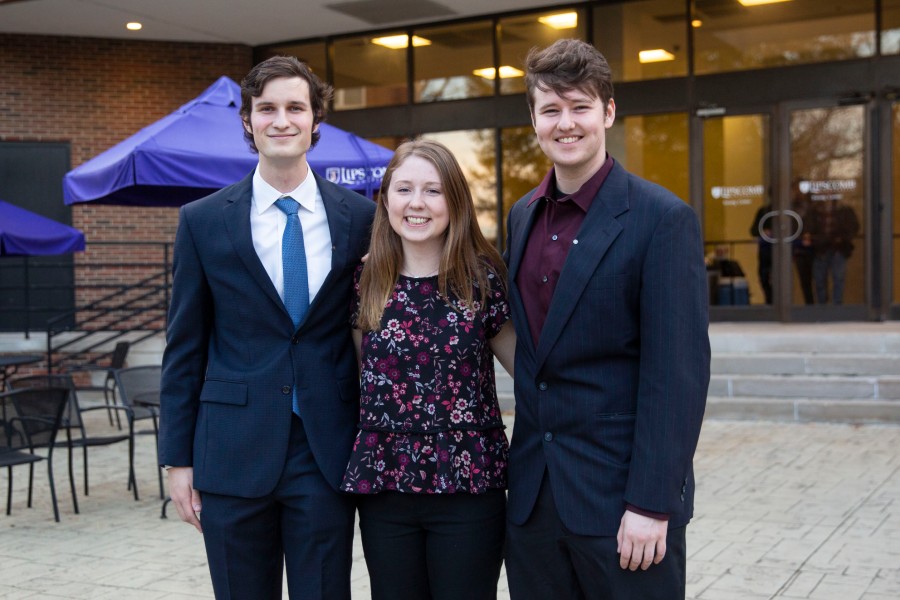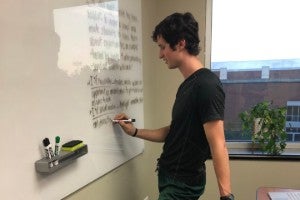Accounting major selected as Stanford University Innovative Fellow
Matt Stuart chosen for program that empowers students to become agents of change.
Janel Shoun-Smith | 615.966.7078 |

Matt Stuart, left, is an Honors College student selected as a Stanford Innovation Fellow. Also pictured are fellows Lydia Baker and Jeremy Beeman. The fourth fellow Josh Hayslett is not pictured.
Honors student Matt Stuart was one of four at Lipscomb to earn the University Innovation Fellows status from Stanford University following a rigorous application process that included a proposal to increase Lipscomb’s campus engagement in entrepreneurial and innovative thinking and activities.
Stuart, a sophomore accounting major from Memphis, was among 360 students from 90 colleges and universities in 13 countries to be accepted by Stanford’s Hasso Plattner Institute of Design University Innovation Fellows program.
“This program has challenged me to think differently about how I approach problems on my campus and my future workplace, and I have learned so much in the short seven weeks since the start of the program,” said Stuart.
The fellows program empowers students to become agents of change at their schools by creating student innovation spaces, starting entrepreneurship organizations, facilitating experiential workshops, working with faculty and administrators to develop new courses and much more. They serve as advocates for lasting institutional change with academic leaders.
As part of the six-week application process, the four Lipscomb UIF fellows were immersed in high-level training on design thinking concepts that involved stakeholders on campus. Then they applied their ideas to Lipscomb and developed a proposal for strategies to increase campus engagement in entrepreneurial and innovation thinking and activities, he said.
One of the biggest lessons Stuart is taking with him from this experience is that “all change starts small,” he said.

The Lipscomb team worked tirelessly for more than six weeks planning their project.
“A movement starts with an individual, and often its success is determined by the dedication of the individual and their first supporters to daily learning and improvement,” he said. “This program has provided me with a fresh perspective on the role of business within innovation and entrepreneurship.
“Business can be an incredibly effective tool, especially when it comes to creating positive change. Indeed, the marketplace is always changing, as it is the place where new ideas, products and resources come together to solve the daily problems that people face. Using business to solve these problems presents challenging yet exciting possibilities for lasting impact.”
In spring 2020, Lipscomb’s fellows will have the opportunity to participate in the program’s Silicon Valley Meetup in California where they will participate in immersive experiences at Stanford University and Google.
“These four students have worked extremely hard putting in many hours per week for the past seven weeks on top of their class schedule and other job responsibilities to get admitted into the program,” said Jeff Cohu, executive director of the Center for Entrepreneurship and Innovation and associate professor of management in the College of Business. “I am very proud of the hard work and discipline they have displayed to get formally admitted into the UIF program.”
Cohu said the four Lipscomb UIF fellows have been immersed in high-level training on design thinking concepts that involves stakeholders on campus as part of the extensive process. The students applied their ideas to the Lipscomb ecosystem and developed a proposal for strategies to increase campus engagement in entrepreneurial and innovation thinking and activities. They engaged stakeholders across the campus in preliminary discussions and will continue to work on making those connections more deliberate and focused with our Lipscomb ecosystem.
“This will help us as a university to look at entrepreneurial and innovation thinking from a cross-disciplinary approach, which should produce significant benefits over time,” said Cohu.
Click here to learn more about all of Lipscomb’s Stanford Innovation Fellows, including a video of their proposal for innovation at Lipscomb.